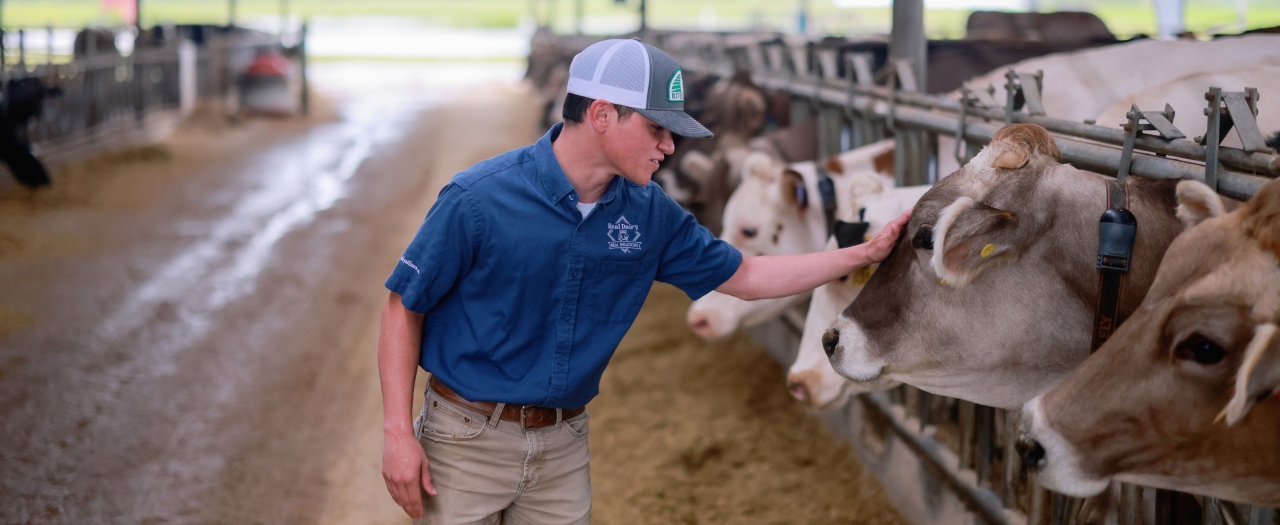By Elise Russell
Cattle and hogs are raised at Eastern Kentucky University’s (EKU) 720-acre Meadowbrook Farm, located less than 10 miles from campus. The meat from the livestock is then sold to EKU Dining and served on campus at Case Dining Hall. Food waste is then sent back to the farm to be composted, which feeds the soil for crop production, which feeds the livestock and brings the entire process full circle.
EKU’s localized food chain supports sustainable agriculture practices and sets an example for others to follow. Dr. John Settimi, EKU agriculture professor, explained that a portion of carbon emissions from meat production comes from the extensive transport of livestock. Often, the process is spread across several states, taking cattle hundreds of miles from Kentucky before eventually returning meat to the state to be sold at the grocery store.
However, the partnership with EKU’s Meadowbrook Farm means the cattle are shipped only once to a nearby USDA butcher in Kentucky and then back, making beef “one of our cleanest products in terms of carbon outputs,” according to Steve Caudill, EKU chief auxiliary services officer.
EKU’s innovation in this field fits right in line with Kentucky’s success in local food and conservation initiatives. As Kentucky’s agriculture commissioner, Jonathan Shell, ’10, focuses statewide efforts on economic development in agriculture, research and development, local food networks and farm retail.
“The closer we can get from the farm gate to the food plate, the more profitable that our farmers are, and the more educated our consumers are,” Shell said. “Farming is the greatest conservation tool that we have in the world. We’re constantly putting back into the land; we’re constantly using conservation practices on the farm; we’re constantly trying to find new ways through innovation and technology to conserve the resources that we have.”
Shell, a fifth-generation farmer, owns and operates Shell Farms and Greenhouses in Garrard County. Over the decades, the family farm has evolved from cattle and tobacco to growing and selling flowers, pumpkins and corn.
Wanting to make a difference in his community, Shell became the youngest member of Kentucky’s General Assembly in 2012 at 24 years old. Now, in his position as the state’s agriculture commissioner, Shell’s passions for farming and serving his community combine to advance the agriculture industry in Kentucky.
“The reason I love being agriculture commissioner is, every single day, I get to have conversations about agriculture and how to promote agriculture and how to move it forward,” Shell said. “Agriculture helps us to be a strong and vibrant civilization and country. A healthy Kentucky is a strong Kentucky, and it’s the same for America and the world.”
Shell’s initiative around food networks and farm retail involves educating people about agriculture while offering the opportunity for farmers to sell goods directly to consumers.
EKU’s Meadowbrook Farm does just that. While the farm provides meals for students, it primarily functions as a hands-on learning environment for academic fields such as agriculture, pre-vet, biology and wildlife management.
Hunter Quinones, ’24, agriculture graduate, remained involved at Meadowbrook Farm throughout his time at EKU. By his senior year, Quinones worked at the farm as a student employee. “Driving a tractor and feeding cows while watching the sun rise before I go to class? It doesn’t get much better than that, in my opinion,” Quinones said.
Originally from Virginia, Quinones found a passion for farming at a young age on his grandfather’s dairy farm in upstate New York. With the experience of working at EKU’s Meadowbrook Farm and knowledge of the management and business side of agriculture from his degree program, Quinones plans to restart his grandfather’s farm with his older brother.
Meadowbrook Farm Manager Matt Collins said, “There’s not one thing at the farm that the students aren’t involved in, whether that’s turning compost or taking care of the dairy cows or helping work beef cows or helping with lamb.”
While already providing a large portion of the meat served on campus, EKU’s Meadowbrook Farm plans to expand the partnership to include poultry and milk. Additionally, the farm eventually wants to sell its products directly to the local community.
“We’re supporting ourselves, we’re supporting each other, and we’re feeding our students and teaching people how to feed the world as we move forward,” said Caudill.
